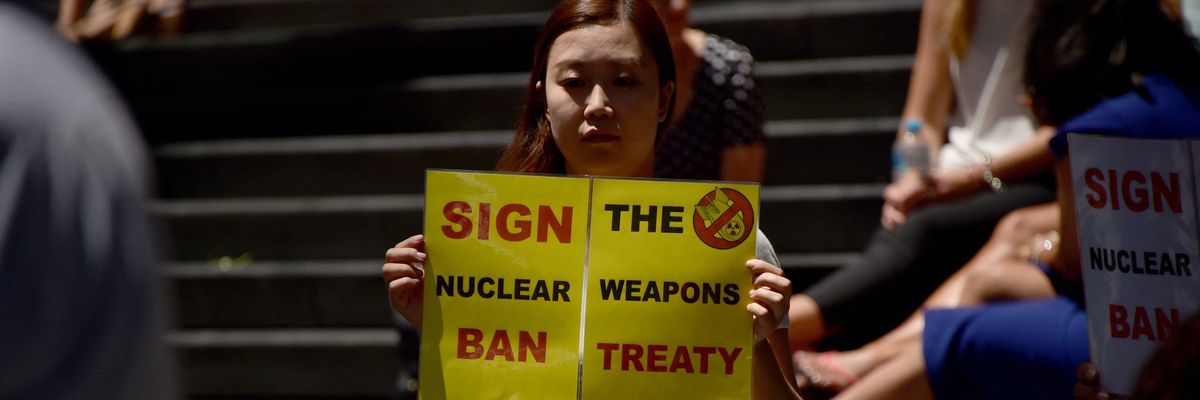A new report published Monday by the Nobel Peace Prize-winning International Campaign to Abolish Nuclear Weapons shows that the world's nine nuclear-armed countries spent more than $157,000 per minute on their atomic weaponry last year, enriching private contractors at the risk of imperiling humankind.
Combined, nuclear-armed nations spent $82.9 billion on their arsenals last year, according to ICAN. The United States was the biggest spender, dumping $43.7 billion into its already massive arsenal in 2022—more than all of the other nuclear-armed countries combined.
"The U.S. Congress allocated $16 billion for the [National Nuclear Security Administration] in 2022 to spend on weapons activities," ICAN's report notes. "In 2022, the Department of Defense requested $27.7 billion for 'nuclear modernization,' including the 'Ground-Based Midcourse Defense, B-21 Bomber, Columbia class submarine, and Nuclear Command, Control, and Communications.'"
Overall, the report shows global spending on nuclear weapons increased for the third consecutive year in 2022.
ICAN describes such spending as immensely wasteful and dangerous to global safety, rejecting commonplace claims that investments in nuclear weapons—particularly as a tool of deterrence—are essential to security.
"Through an ever-changing and challenging security environment, from security threats of climate change to the Covid-19 pandemic to the Russian invasion of Ukraine, nuclear weapons spending has steadily increased, with no resulting measurable improvement on the security environment," the report states. "If anything, the situation is getting worse."
"Luck, not reason or strategy, has kept nuclear weapons from being used in warfare for the past 78 years. But we can't count on our luck to hold in perpetuity."
ICAN argues that consistently growing nuclear weapons spending is an outcome of a vicious cycle whereby tax dollars finance the construction of nuclear weapons by private companies, which proceed to fund think tanks and hire lobbyists to make the case that nuclear weapons are essential to national security—leading governments to continue pouring money "down their nuclear weapons drains."
Last year, according to ICAN's findings, nearly $16 billion in new nuclear weapons contracts were awarded to private corporations.
The companies that received the contracts—such as Bechtel, Boeing, and General Dynamics—"turned around and invested in lobbying governments, spending $113 million on those efforts in the U.S. and France," ICAN notes.
"Together," the report continues, "nuclear weapon-producing companies, nuclear-armed governments, and those in nuclear alliances spent $21-36 million funding the ten of the most prominent think tanks researching and writing about nuclear weapons in nuclear-armed states."
The think tanks highlighted in ICAN's report include the Atlantic Council—which received funding from Bechtel, Boeing, Lockheed Martin, and other major contractors in 2021—and the Brookings Institution, which "received between $600,000 and $1,199,997 from three companies that produce nuclear weapons: Leonardo, Lockheed Martin, and Northrop Grumman."
ICAN published its report on the same day that a new analysis by the Stockholm International Peace Research Institute showed that the number of operational warheads in nuclear-armed nations' arsenals grew last year amid soaring tensions over Russia's invasion of Ukraine.
According to ICAN, "Russia's invasion of Ukraine and overt threats to use nuclear weapons have induced fear across the planet, but have also spurred a resilience and re-thinking of outdated concepts like nuclear deterrence," which suggests the threat of nuclear retaliation is sufficient to deter nuclear-armed countries from using the civilization-threatening weaponry.
ICAN has argued that the idea of nuclear deterrence "makes nuclear use more likely because the threat of use of nuclear weapons must be credible, and so the nuclear-armed states are always poised to launch nuclear weapons."
"Luck, not reason or strategy, has kept nuclear weapons from being used in warfare for the past 78 years. But we can't count on our luck to hold in perpetuity," the group's new report states. "For the first time in decades, the general public was confronted with a very real threat of nuclear war in 2022. The threat that nuclear weapons pose, as long as they exist, became tangible, with iodine tablets selling out across Europe and an increase in demand for nuclear bunkers."
ICAN concludes its report by imploring all nations to sign and ratify the Treaty on the Prohibition of Nuclear Weapons (TPNW), a legally binding international agreement that none of the nine nuclear-armed countries have signed. The United States and Russia, which together possess 90% of the world's nuclear warheads, have both opposed U.N. resolutions welcoming the TPNW and urging countries to swiftly ratify it.
To date, more than 90 countries have signed the treaty and nearly 70 have ratified it.
"The Treaty on the Prohibition of Nuclear Weapons is the multilateral response to the irresponsible behavior of all nuclear-armed states," ICAN's report says. "It is the normative barricade against threats to use nuclear weapons. All countries should join this landmark international instrument to prohibit the development and maintenance of nuclear weapons and prevent their eventual use by ensuring their elimination."

